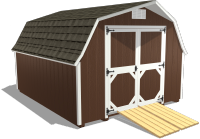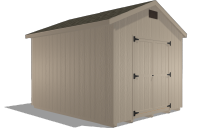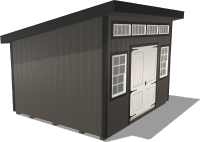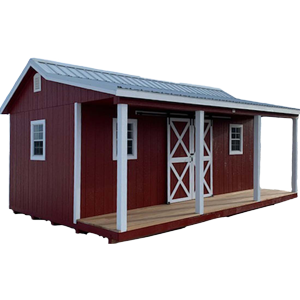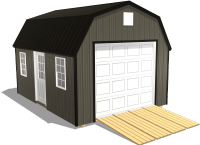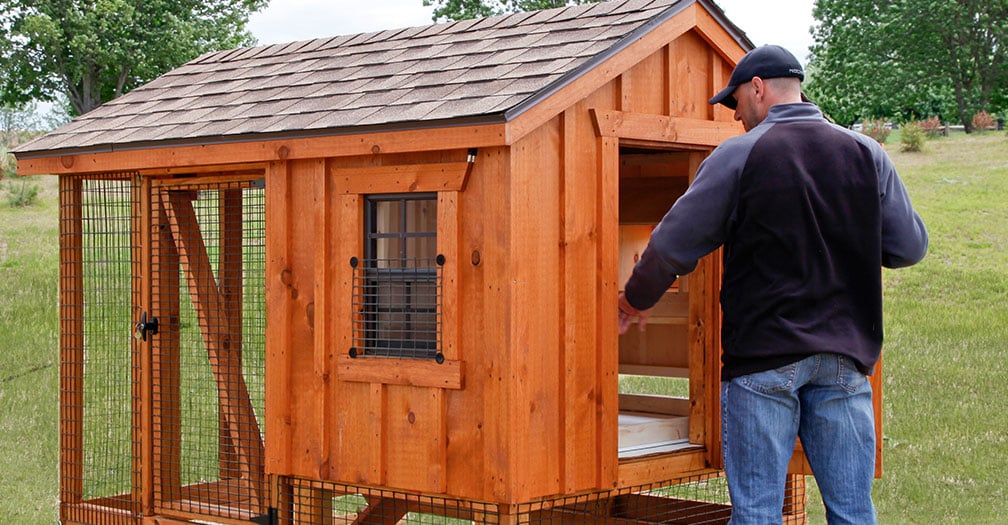How to Clean a Chicken Coop
by Dakota Storage Buildings, on August 05, 2020
Follow both a regular and thorough cleaning routine to keep chickens healthy and coops smelling fresh.
Despite the bad rap they sometimes get, most people who raise chickens will tell you they're not smelly animals. Now, chicken coops can be another matter — if they aren't properly maintained. Imagine a dirty cat litter box, and you begin to get the idea.
Chicken coop cleaning isn't difficult and requires only a modest time investment if you stay on top of it. Your chickens will stay healthier, and thank you with the glorious gift of eggs (dirty nesting boxes can deter chickens from laying). As added benefits, chicken manure makes excellent compost, and your coop will last longer when well cared for, so your cleaning efforts will be rewarded.
Pasture-raised hen eggs can have as much as 67% more vitamin A, 200% more Omega-3s, 300% more Vitamin E, 700% more Beta carotene, 33% less cholesterol, and 25% less saturated fat.
The average chicken produces 300 eggs and about 90 pounds of manure each year. When properly composted, chicken manure is among the most desirable organic fertilizers for gardens. And, if you raise chickens, it’s readily available and totally free.
Learning how to clean a chicken coop properly will protect your chickens and coop investment, plus it'll pay off by keeping healthy food on your table. So, let's get to it!
Regular Chicken Coop Cleaning
The recommended chicken coop cleaning schedule varies based on your coop size and the number of hens you’re raising. Based on your needs and preferences, you can opt to clean the coop weekly, bi-weekly, or monthly, along with spot cleaning every other day. Expect a basic cleaning to take about 15 minutes.
TIP: If your coop starts to smell bad or your chickens aren’t producing well, that’s a pretty good sign that you need to increase your frequency.
- Roosting Bars - Use a square shovel or garden hoe to scrape off waste.
- Nesting Boxes - Scrape the bedding onto the floor and replace it with fresh material. Pine and cedar shavings work well and offer a nice woodsy scent. Mix in some dried herbs like mint or rosemary for additional aromatics and to help keep pests away.
- Coop Floors & Run - Choose your preferred method.
- Regular Method - Shovel or sweep old material out regularly and add to an external compost pile, if desired. Add fresh material to the floor (pine or cedar for the coop and sand for the run).
- Deep Litter Method - Regularly add carbon-based liter material (pine, leaves, grass clippings, etc.) to the coop floor. Turn and level the pile, watching for wet spots that can harbor mold and bacteria. Allow this to compost and plan to scoop it out a few times a year. (Note: This method can pose a health hazard to your chickens if proper ventilation and moisture balance are not maintained. We recommend further research before going this direction.)
- Feeding Area - Clean your feeding and watering system by hosing them off and allowing them to air dry. This can be done daily, leaving food containers empty at night to avoid attracting unwanted rodents or other wildlife.
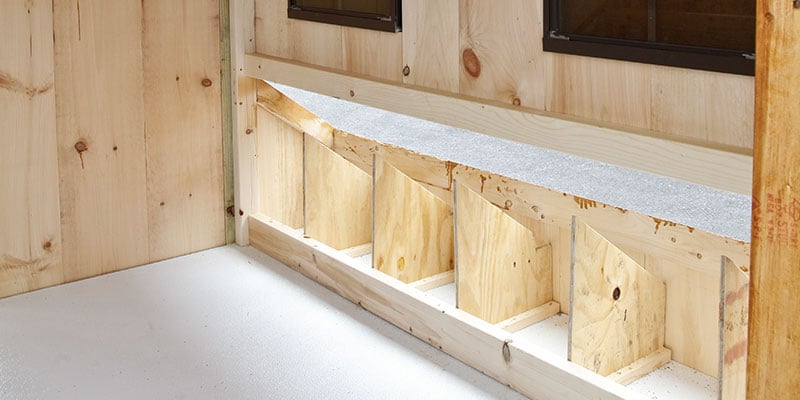
Here are a few bonus cleaning and composting tips.
- Fresh chicken manure is high in nitrogen and too hot to apply directly to growing gardens. Be sure to allow ample time for manure to compost before adding to gardens.
- Sprinkle diatomaceous earth on top of the bedding and floor to help keep mites out of your coop.
- Keep food and water away from areas where chickens poop the most, such as roosting bars and nesting boxes.
- Wet manure attracts flies, so spot-clean bedding by removing large piles of manure and adding fresh bedding. Or, place a dropping board under the roosts and perches for easy removal. Simply scrape the boards off daily. Inspect dropping boards as you clean for changes in manure that might indicate health issues.
- Create your own fly repellent, a mixture of vinegar, water, and essential oils, to spray over bedding and floor material to repel bugs and freshen coop. (Rosemary, basil, dill, peppermint, spearmint, lavender, thyme, geranium, lemongrass, citronella, lemon, and wild orange are all great options.)
Thorough Coop Cleaning & Sanitizing
Once or twice a year, you’ll want to clean your chicken coop more thoroughly. Spring cleaning applies to coops, too — plus, it’s the perfect time to use your compost to enrich the soil in your gardens.
It’s also a good idea to give your coop a deep cleaning anytime you want to introduce new chickens to your flock. Since young chicks are more susceptible to diseases and bugs, it’s best to give them a fresh, clean start.
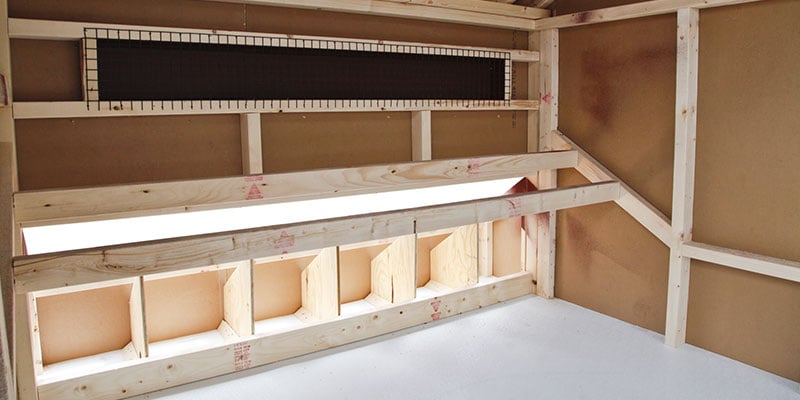
Follow these steps for a deep cleaning once or twice a year.
- Scrape the manure off the roost.
- Use a shovel or hoe to thoroughly scrape manure, dirt, feathers, etc. out of the coop. If you use the deep litter method, this is the time to remove and use your compost.
- Attach a jet spray nozzle to your garden hose and work from top to bottom to soften and remove any remaining debris.
- Sweep out the areas where sludge may have settled.
- Dampen all areas with your hose, then splash or spray white vinegar (never use bleach) on surfaces. Scrub with brush or broom — don’t forget the roost!
- Rinse the area thoroughly then leave windows and doors open to air dry.
- Check the coop structure for wear and tear or damaged areas that need attention.
- When the coop is completely dry, replace all areas with fresh bedding and material.
Benefits of a Quality Chicken Coop
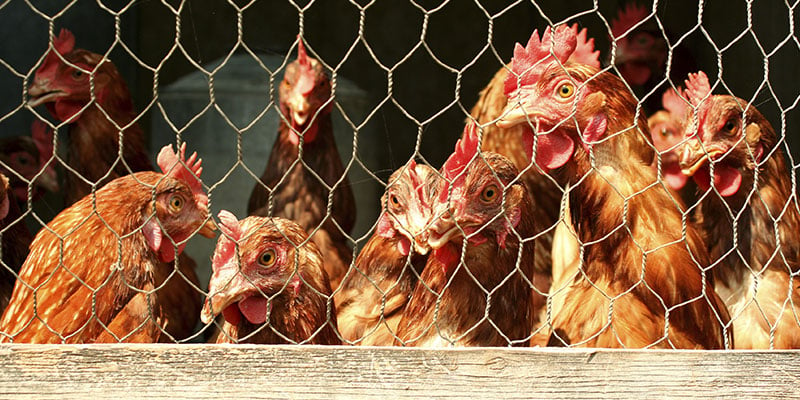
Not all chicken coops are created equal. If your existing coop is looking a little worse for the wear or you’re in the market for a new coop, Dakota Storage Buildings offers high-quality chicken coops featuring premium durable and weather-resistant materials that are guaranteed to last for years. From nesting boxes to flooring and wall sheathing, our coops will protect your chickens and provide a comfortable shelter.
For more tips on chicken coop cleaning and information on raising happy and healthy chickens, see download our free guide today.





